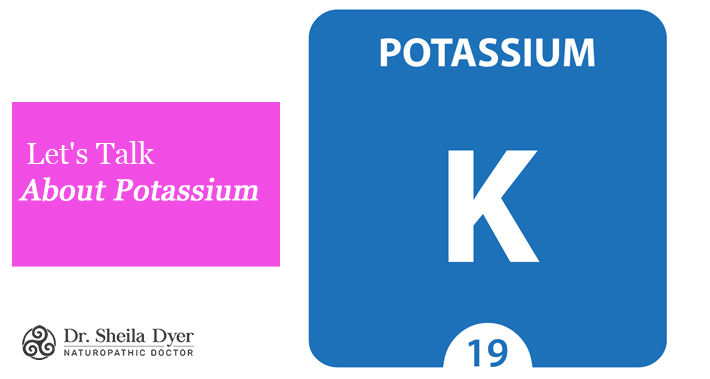In order to function properly, there are countless vitamins and minerals your body needs.
As a naturopathic doctor in Toronto, I want to help you make sense of what your body needs, and why it needs it.
You’re likely familiar with some of these.
For instance, everyone knows vitamin C helps strengthen your immune system, and calcium is important for strong bones.
The role of other vitamins and minerals may not be as well known, even though they are all incredibly important.
Today we’re going to have a closer look at the benefits of potassium, as well as how to tell when you may be deficient and what you can do about it.
What Is Potassium?
Potassium is both a mineral, and an electrolyte.
It plays a role in a variety of body functions, including:
- Heart rhythm
- Blood pressure
- Digestion
- Maintaining water balance
- Muscle function
Potassium is an essential nutrient, which means it can’t be produced by the body, so you need to ensure you are getting it through your diet, or via supplementation.
Too much potassium is also known as hyperkalemia, while too little is hypokalemia.
Health Benefits Of Potassium
Getting enough potassium is incredibly important to keeping your body functioning at its peak.
Let’s have a look at some of the important roles it plays in your body.
1. It Helps Regulate Fluids In Your Body
You’ve likely heard the human body is made up of sixty person water.
However, the reason you don’t just slosh around every time you move is because roughly forty percent of that water is contained inside your cells.
The rest makes up your spinal fluid, blood, and the liquid between cells, or extracellular fluid.
Electrolytes, such as potassium, help to maintain the balance of fluid inside and outside of your cells.
2. Your Muscles Need It To Work Properly
Blood potassium levels play a role in the creation of nerve signals, which help to control muscle contractions.
Of course, every action we make is as a result of contraction and expansion of our muscles, which makes these signals incredibly important for performing our day to day tasks.
In addition, potassium is important for the functioning of the heart muscle and keeping your heart healthy by maintaining a regular heartbeat.
3. It Can Help Lower Blood Pressure
Hypertension, or high blood pressure, is an extremely common issue.
One major culprit of this is diets which are high in salt – or sodium.
Potassium can help regulate the amount of sodium in the body by helping to eliminate it when there is too much.
4. It Helps Your Nervous System Function
The nervous system includes your brain, spinal cord, and nerves which carry signals from your brain to your body.
Nerve impulses affect everything from your heartbeat to your reflexes.
Low potassium levels can affect the functioning of these nerve impulses.
5. May Reduce Your Risk Of Osteoporosis
Osteoporosis is a disease characterized by weak and brittle bones.
Usually when you think of bone health, you likely think of calcium, and maybe vitamin D.
However potassium may also play an important role in bone health.
There is evidence to suggest eating a diet rich in potassium may help reduce the amount of calcium lost through urinating.
Signs Of Potassium Deficiency
The symptoms of low potassium can vary, depending on how severe the deficiency is, however, some signs to watch out for include:
- Abnormal heartbeat
- Being very tired
- Weak muscles
- Muscle cramps and spasms
- Vomiting
- Nausea
- Constipation
If you’re experiencing these symptoms and can’t seem to pinpoint the cause, you may want to speak to your naturopathic doctor for a blood test to look for hypokalemia.
Dietary Sources Of Potassium
If you’re looking to get more potassium in your diet, consider adding some of the following foods to your next meal:
- Nuts
- Beans
- Whole grains
- Kiwi
- Bananas
- Apricot
- Carrots
- Potatoes
- Leafy greens
- Lean meat
Can You Overdose On Potassium?
Potassium overdose is rare for individuals who rely on their diet alone to get the potassium their body needs.
Those who use potassium supplements should consult with a naturopathic doctor to ensure they are taking the right dose, and not at risk of overdose.
Other risk factors which can lead someone to be more susceptible to hyperkalemia include:
- Type 2 diabetes
- Undergoing chemotherapy
- Kidney issues
- Over exercising
- Use of cocaine
- Certain diuretic medications
Most cases of high potassium will not have any recognizable symptoms, however, one which may show up is arrhythmia (abnormal heartbeat).
Book Your Appointment With Dr. Sheila Dyer, ND, Today
Are you worried about getting enough potassium?
Perhaps you’re worried about hypokalemia because of a condition such as diabetes, or because you’re undergoing chemotherapy.
Maybe you just want to do an overall health check to ensure you’re getting enough vitamins and minerals overall, to ensure your body is functioning at its best.
Whatever your reasons for wanting to talk to someone about your vitamin and mineral levels, I can help.
I’m Dr. Sheila Dyer, ND, a Toronto based naturopathic doctor, and I want to help you with your concerns.
Contact my office today for more information or to book a consultation.
If you have questions about naturopathic medicine, or would like to start with your first consultation, contact me, and let’s book an appointment.
Dr. Sheila Dyer, ND1080 Dovercourt Rd,
Toronto, ON M6H 2X8
(416) 554-5135
► https://g.page/DrSheilaDyerNd
Dr. Sheila Dyer is a Naturopathic Doctor and a practicing registered nurse offering holistic healthcare with a scientific focus

